The Association of Theological Institutes in the Middle East - ATIME
1. Identity
The Association of Theological Institutes in the Middle East (ATIME) - designated as such since the 1980 General Meeting- was established in 1967 with the name ATENE (Association for Theological Education in the Near East).
ATIME is considered as an important axis for the Ecumenical movement in the Middle East. Hence, it was affiliated to The Middle East Council of Churches (MECC) in 1975. It functioned in tight collaboration with MECC Secretary General and the Director of the Faith and Unity Department.
At the time, it included 18 Institutes belonging to the four Families of Churches in the Middle East (Egypt, Lebanon, Syria, Iraq).
2. Mission
Connecting the theological colleges and institutes in order to exchange resources, as well as academic and church experiences to better witness for Faith and Unity in the context of the Middle East.
3. Vision
Strengthening and promoting cooperation between the academic theological institutes of diverse agents (clergymen and lay people) of the Churches in the Middle East in view of contributing to implement « koinonia in praxis » among the Institutes, professors, researchers, and students.
4. Objectives
1. At the Academic Level
To provide a quality theological education in conformity with the contemporary requirements of the Middle East region through:
a. Establishing a collaboration platform between professors and researchers
b. Creating courses common to all the theological education Institutes.
c. Creating access to shared material and pedagogical resources (Libraries, Electronic resources, MA and PHD theses, etc.) as well as a human potential to better supply for the academic requirements.
d. Developing theological cooperation with other theological Institutes at the regional and international levels.
2. At the Ecclesial Level
To preparing the future clergymen and lay people to carry out the tasks of the churches, in an ecumenical spirit capable of meeting the contextual challenges of the region through:
a. Promoting the secondary objectives of the above mentioned academic plan
b. Providing the environment conducive to fraternal, personal and institutional relations between all partners: teachers, researchers and student-agents of the ecclesial mission
ATIME NEWS
The Second Annual Student Conference - Obour - Cairo
“We Witness Together” is the title of the second annual student conference of the Association of Theological Institutes in the Middle East – A.T.I.M.E., which was held at St. Mark's Conference House in the Obour – Cairo, between 7 and 12 July 2024, with the participation of 40 students from 18 Theological Institutes in the Middle East. The conference was organized and attended by the President of the Association Archimandrite Professor Jack Khalil, Dean of the Saint John of Damascus Theological Institute at the University of Balamand, the Executive Secretary Father Dr. Michael Kanbar, and members of the Executive Secretariat of the Association, Reverend Dr. Bishoy Helmi, Reverend Dr. Samuel Rozfi, and the Rt. Reverend Father Bassam Nassif, who was unable to attend for personal reasons.
Attendees and Participnats were also the Secetary General of the Middle East Council of Churches (MECC) Dr. Michel Abs, the Association Members Dr. Gergis Saleh, the Honorary Secretary General of the Middle East Council of Churches (MECC), Dr. Ishak Ibrahim Ajban Shenouda from the Institute of Coptic Studies, and Dr. Michael Edward Abdo Mikhael from the Institute of Care and Education.
Hence, the video report provides an overview of the work of this conference.
In the Church of the Patriarchal Monastery of St. George, Cairo
At the invitation of the Rt. Reverend Archimandrite Damaskinos Alazrai, Head of the Patriarchal Monastery of St. George of the Greek Orthodox Patriarchate of Alexandria and All Africa in Cairo, the Rt. Reverend Archimandrite Jack Khalil, Dean of the Saint John of Damascus Institute at the University of Balamand in Lebanon and President of the Association of Theological Institutes in the Middle East A.T.I.M.E., presided over the Divine Liturgy, on Sunday 14 July 2024, at the Monastery’s Church.
The Mass was attended by Dr. Michel Abs, the Secretary General of the Middle East Council of Churches (MECC), Arlette Michel, President of the Good Shepherd Greek Orthodox Association in Heliopolis, and Member of the General Assembly of the Middle East Council of Churches (MECC), the Journalist Lea Adel Maamary, the MECC Media Church Relations Coordinator, and believers.
Afterwards, there was a tour in the Patriarchal Monastery of St. George and a visit to both the Babylon Fortress and the Greek Orthodox Center for Studies and Dialogue in the Monastery.
In this context, the video report presents some details about the Divine Liturgy, as well as the tour that was held after it.
Stressing the Importance of Dialogue and Convergence
Cairo, July 14, 2024
Dr. Michel Abs, the Secretary General of the Middle East Council of Churches (MECC), concluded his visit to the Arab Republic of Egypt, with the visit of His Eminence Bishop Anba Ermia, General Bishop, President of the Coptic Orthodox Cultural Center and Assistant Secretary General of the Egyptian Family House. Dr. Abs was accompanied by the Journalist Lea Adel Maamary, the MECC Media Church Relations Coordinator. The visit took place at the Center’s headquarters - Cairo.
During the meeting, Dr. Michel Abs spoke at length about the issue of dialogue which MECC is working on it, through conferences and lectures that are being prepared and presented under the title of shared religious spaces.
Emphasizing the Importance of the Role of Purposeful Media that Educates Generations
Cairo, July 14, 2024
As part of his visit to Egypt, Dr. Michel Abs, the Secretary General of the Middle East Council of Churches (MECC), met with Reverend Nadi Labib, Head of the Media Council of the Evangelical Synod of the Nile and Member of the Middle East Council of Churches (MECC) Executive Committee. Dr. Abs was accompanied by the Journalist Lea Adel Maamary, the MECC Media Church Relations Coordinator. The visit took place at the headquarters of the Evangelical Church - Mokattam - Cairo.
Cairo, July 14, 2024
The Rt. Reverend Archimandrite Jack Khalil, Dean of the Saint John of Damascus Institute at the University of Balamand, Lebanon, and President of the Association of Theological Institutes in the Middle East A.T.I.M.E., and Dr. Michel Abs, the Secretary General of the Middle East Council of Churches (MECC), continued their pilgrimage to the Patriarchal Monastery of St. George in Cairo, affiliated to the Greek Orthodox Patriarchate of Alexandria and All Africa for the Greek Orthodox, and visited the Roman Fortress of Babylon.
They were accompanied by the Rt. Reverend Archimandrite Damaskinos Alazrai, the Head of the Monastery, and the Journalist Lea Adel Maamary, the MECC Media Church Relations Coordinator. The visitors had a look at the Fortress, its sections, and content, as well as visited its Churches, the graves of the Patriarchs and of the new holy martyrs, as well as everything it includes.
The Center Is a Beacon of Interfaith Dialogue and an Embodiment of Common Life
Cairo, July 14, 2024
The Rt. Reverend Archimandrite Jack Khalil, Dean of the Saint John of Damascus Institute at the University of Balamand, Lebanon, and President of the Association of Theological Institutes in the Middle East A.T.I.M.E., Dr. Michel Abs, the Secretary General of the Middle East Council of Churches (MECC), the Rt. Reverend Archimandrite Damaskinos Alazrai, Head of the Patriarchal Monastery of St. George affiliated to the Greek Orthodox Patriarchate of Alexandria and All Africa, and the Journalist Lea Adel Maamary, the MECC Media Church Relations Coordinator, visited the Greek Orthodox Center for Studies and Dialogue in Cairo, located in the Patriarchal Monastery of St. George.
The delegation had a look at the center, which aims to embody the Church’s Holy message, its love, and openness to our era and its requirements. Hence, Archimandrite Damaskinos Alazrai confirmed to the MECC media that: “The idea of establishing the Patriarchal Center for Dialogue and Studies for the Greek Orthodox Patriarchate of Alexandria and All Africa came with the aim to have a center for dialogue that is consistent with its extended role through the ages.
Archimandrite Damaskinos Alazrai: “The Theological Institute in Balamand is an unparalleled intellectual and cultural oasis, and MECC has proven its presence and distinction through its humanitarian programs and projects”
Cairo, July 14, 2.24
At the invitation of the Rt. Reverend Archimandrite Damaskinos Alazrai, Head of the Patriarchal Monastery of St. George of the Greek Orthodox Patriarchate of Alexandria and All Africa in Cairo, the Rt. Reverend Archimandrite Jack Khalil, Dean of the Saint John of Damascus Institute at the University of Balamand in Lebanon and President of the Association of Theological Institutes in the Middle East A.T.I.M.E., presided over the Divine Liturgy at the Monastery’s Church.
The Mass was served by students from the Theological Institute of Balamand.
The Mass was attended by Dr. Michel Abs, the Secretary General of the Middle East Council of Churches (MECC), Arlette Michel, President of the Good Shepherd Greek Orthodox Association in Heliopolis, the Journalist Lea Adel Maamary, the MECC Media Church Relations Coordinator, and believers.
Cairo, July 14, 2024
By: The Journalist Lea Adel Maamary
Attention is drawn to the Patriarchal Monastery of St. George in Ancient Egypt, located in the Babylon region, which took its name after the settlement of Babylonian prisoners who were brought to Egypt by Pharaoh Ramesses I.
This area is located about five kilometers South of Central Cairo, and opposite the Giza Pyramids. Today, it is one of the most densely populated suburbs of Cairo, which includes many Monasteries, places of worship, and cemeteries.
Cairo, July 13, 2024
In our recent era, and amidst the unprecedented developments witnessed in the fields of technology, artificial intelligence, and the digital revolution, which constitutes a new challenge to the educational systems and learning in colleges and institutes in the world, the Deans of the Theological Colleges and Institutes in the Middle East – A.T.I.M.E., members of the Association, held a symposium at the New Papal Residence in Cairo, presided over by the Rt. Reverend Archimandrite Jack Khalil, Dean of the Saint John of Damascus Theological Institute at the University of Balamand, Lebanon, and President of A.T.I.M.E. It was hosted and attended by His Eminence Bishop Anba Michael, Bishop of Helwan and Al Masara and Vice Dean of the Seminary Institute - Bishop Anba Royce, delegated by His Holiness Pope Tawadros II, Pope of Alexandria and Patriarch of the See of St. Mark, Dr. Michel Abs, the Secretary General of the Middle East Council of Churches (MECC), the Secretary General of the Egypt Council of Churches Reverend Yoshua Yacoub, representatives of the Churches in Egypt, the MECC Media Church Relations Coordinator the journalist Lea Adel Maamary, Professors, and student representatives.
A Prayer in Front of the Relics of St. Mark the Apostle – Egypt
Cairo, July 13, 2024
Dr. Michel Abs, the Secretary General of the Middle East Council of Churches (MECC), participated in the pilgrimage visit made by the Association of Theological Institutes in the Middle East A.T.I.M.E., headed by its President the Rt. Reverend Archimandrite Jack Khalil, Dean of the Saint John of Damascus Theological Institute at the University of Balamand, Lebanon, and Father Dr. Michael Kanbar, the Executive Secretary of A.T.I.M.E., the MECC Honorary Secretary General Dr. Gergis Saleh, the MECC Associate Secretaries General Reverend Refaat Fikri, Father Dr. Nicolas Bustros, and the Deans of the Theological Colleges and Institutes in the Middle East and their representatives, to the Coptic Orthodox Cathedral of St. Mark in the Abbasiya area in Cairo. Dr. Gergis Saleh presented to the participants an extensive explanation of the history of the Cathedral and its Icons.
Then, they visited the Shrine of St. Mark the Apostle, prayed and were blessed from his relics.
Cairo, July 12, 2024
In addition to the work of the General Assembly of the Deans of Theological Colleges and Institutes in the Middle East, Dr. Gergis Saleh, the Honorary Secretary General of the Middle East Council of Churches (MECC), offered some souvenirs in the name of His Holiness Pope Tawadros II, Pope of Alexandria and Patriarch of the See of St. Mark, to Dr. Michel Abs, the Secretary General of the Middle East Council of Churches (MECC), the Rt. Reverend Archimandrite Jack Khalil, Dean of the Saint John of Damascus Institute at the University of Balamand in Lebanon and President of the Association of Theological Institutes in the Middle East A.T.I.M.E., and Father Dr. Michael Kanbar, the Executive Secretary of the Association of Theological Institutes in the Middle East A.T.I.M.E.
Who Delivered a Speech Entitled “Together from the Sources”
Cairo, July 12, 2024
Dr. Michel Abs, the Secretary General of the Middle East Council of Churches (MECC), participated in the General Assembly meeting of the Association of Theological Institutes in the Middle East A.T.I.M.E., held at St. Mark’s House – El Shourouk, Cairo.
The General Assembly meeting was presided over by the Rt. Reverend Archimandrite Jack Khalil, the Dean of the Saint John of Damascus Institute at the University of Balamand, Lebanon, and President of A.T.I.M.E., in the presence of Father Dr. Michael Kanbar, the Executive Secretary of A.T.I.M.E., and the presence of the MECC Honorary Secretary General Dr. Gergis Saleh, and the MECC Associate Secretaries General Reverend Dr. Refaat Fikry and Father Dr. Nicolas Bustros, as well as the Deans of the Colleges and Theological Institutes in the Middle East and their representatives.
Firstly, the President of A.T.I.M.E., the Rt. Reverend Archimandrite Dean Jack Khalil, welcomed the attendees, and spoke about the importance of the meeting and what it will include.
Then, Dr. Michel Abs, the Secretary General of the Middle East Council of Churches (MECC), delivered a speech entitled “Together from the Sources,” in which he said:
The Association consists of colleges and theological institutes affiliated with the member churches of the Middle East Council of Churches, means that it is truly ecumenical in depth, in goals, approaches and methods…
the Middle East Concluded this Conference by A Meeting with His Eminence Bishop George Chihan in Cairo
Bishop Shihan: “We must adhere to the sentence, ‘Do not be afraid’”
Dr. Abs: “A.T.M.E. is a strategic element in MECC”
Cairo, July 11, 2024
The workshops of the second annual conference of the Association of Theological Institutes in the Middle East – A.T.I.M.E. ended. It was held at St. Mark's Conference House in the Obour area - Cairo, under the title "We Witness Together."
In a final phase, the students paid a visit to His Eminence Bishop George Chihan, the Most Respected, Head of the Maronite Diocese of Cairo, Egypt and Sudan. The delegation was headed by the Rt. Reverend Archimandrite Jack Khalil, Dean of the Saint John of Damascus Institute at the University of Balamand, Lebanon, and President of A.T.I.M.E., and included Dr. Michel Abs, the Secretary General of the Middle East Council of Churches (MECC), Father Dr. Michael Kanbar, the Executive Secretary of A.T.I.M.E., Reverend Bishoy Helmi, the Associate Executive Secretary, Reverend Dr. Samuel Rosvi, the Associate Executive Secretary, and the MECC Media Church Relations Coordinator the journalist Lea Adel Maamary.
In an atmosphere full of love and fraternity, His Eminence and a group of Priest fathers received the students in the Diocese headquarters.
“We found in the Conference ‘We Witness Together’ An Opportunity for Meeting, Acquaintance, and True Fraternity”
Cairo, July 11, 2024
The organizers of the workshops of the second annual conference of the Association of Theological Institutes in the Middle East – A.T.I.M.E., held under the title “We Witness Together”, at St. Mark's Conference House - Cairo, organized many pilgrimage visits for the students to Churches and natural landmarks that trace the history of Egypt and its ancient civilization.
The participating students confirmed in a media interview with the Middle East Council of Churches:
“This conference has clear and important implications, as it created an opportunity for acquaintance, meeting, fraternity, and dialogue between students in their various Churches. In fact, the visits and tours that culminated their workshops gave them a new incentive that the love which unites them is the strongest bond. It made them get to know each other more, exchange conversations, and discuss a lot of important issues in the language of true dialogue and great love.”
He Addresses the Students and Says: “
Your Role, From Generation to Generation, is to Establish a Change in Thinking Style and Mentality”
Cairo, July 11, 2024
The workshops of the second annual conference of Association of Theological Institutes in the Middle East – A.T.I.M.E. culminated in a fruitful lecture presented by Dr. Michel Abs, the Secretary General of the Middle East Council of Churches (MECC), entitled “Ecumenical Work and Rapprochement Under the Umbrella of the Middle East Council of Churches” at St. Mark’s Conference House in the Obour area - Cairo. The conference is held with the participation of forty students, from many Churches and countries.
Alongside the students, participants in the lecture were the Rt. Reverend Archimandrite Jack Khalil, Dean of the Saint John of Damascus Theological Institute at the University of Balamand, Lebanon, and President of A.T.I.M.E., Father Dr. Michel Kanbar, Executive Secretary of A.T.I.M.E., Reverend Bishoy Helmi, Associate Executive Secretary of A.T.I.M.E., Reverend Dr. Samuel Rozfi, Co-Executive Secretary of A.T.I.M.E.
Spiritual Lectures Strengthened the Work of the Second Annual Conference of A.T.M.E. - Cairo
Cairo, July 10, 2024
The second annual conference of the Association of Theological Institutes in the Middle East – A.T.I.M.E., held at St. Mark's Conference House in the Obour area - Cairo, continued its workshops entitled "We Witness Together."
The forty students began their third day with a Prayer according to the ritual of the Greek Orthodox Church.
Cairo - July 10, 2024
The Association of Theological Institutes in the Middle East – A.T.I.M.E. launched its second annual student conference at St. Mark's Conference House in the Obour area - Cairo.
The conference was organized and attended by The Rt. Reverend Archimandrite Jack Khalil, Dean of the Saint John of Damascus Institute at the University of Balamand, Lebanon, and President of A.T.I.M.E., the Executive Secretary of A.T.I.M.E. Father Dr. Michael Kanbar, Reverend Bishoy Helmi, the Associate Executive Secretary of A.T.I.M.E., and Reverend Dr. Samuel Rozfi, the Associate Executive Secretary of A.T.I.M.E.
Attendees and participants were also members of A.T.I.M.E.: Dr. Gergis Saleh, Honorary Secretary General of the Middle East Council of Churches (MECC), Dr. Ishak Ibrahim Ajban Shenouda from the Institute of Coptic Studies, Dr. Michael Edward Abdo Mikhael from the Institute of Care and Education, and forty students from many countries.
Cairo - July 10, 2024
Dr. Michel Abs, the Secretary General of the Middle East Council of Churches (MECC), arrived in Cairo to participate in the second annual conference of the Association of Theological Institutes in the Middle East – A.T.I.M.E under the title “We Witness Together.”
He was accompanied on the visit by the MECC Media Church Relations Coordinator the journalist Lea Adel Maamary.
They were received at St. Mark's Conference House in the Obour area by the The Rt. Reverend Archimandrite Jack (Khalil), Dean of the Saint John of Damascus Institute at the University of Balamand in Lebanon and President of the Association of Theological Institutes in the Middle East A.T.I.M.E.
On Charity Radio TV
Father Dr. Michael Kanbar, the Executive Secretary of the Association of Theological Institutes in the Middle East (ATIME), was the guest of the journalist Zouhour Abou Mansour, in an episode within the program “Hawana Hawak”, broadcasted on Charity Radio TV, on Monday 19 February 2024.
During the interview, which you can watch in the video, Father Dr. Michael Kanbar, highlighted the ATIME, its goals and the most prominent programs it implements, especially with students of Theological Institutes in the region. He also talked about the gathering organized by the ATIME for the students of Theological Institutes in Lebanon, under the title “The Deposit of Faith, So That We May Know What We Have Received and How to Transfer It.” It was held on Tuesday 20 February 2024, at La Sagesse University, Furn Al-Chebbak - Beirut.
for the Students of Theological Institutes in Lebanon
On Télé Lumière and Noursat TV Channel
Father Dr. Michael Kanbar, the Executive Secretary of the Association of Theological Institutes in the Middle East (ATIME), was the guest in an episode within the program “All Nour Maana” (which means “The Lights Is with Us”), broadcasted on Télé Lumière and Noursat TV Channel, on Thursday 15 February 2024, to talk about the annual gathering that ATIME will organize for the students of Theological Institutes in Lebanon, on Tuesday 20 February 2024, at La Sagesse University, Lebanon.
During the interview, which you can watch in the video, Father Dr. Michael presents an introduction about the Association of Theological Institutes in the Middle East (ATIME), highlighting its mission and the projects it is implementing in the Middle East region. Father Dr. Michael also talks about the goals of the gathering that ATIME will hold for the Theological students in Lebanon and its program.
Organized by the Association of Theological Institutes in the Middle East (ATIME)
Hosted by the Coptic Catholic Seminary in Maadi, Headed by Father Bishoy Rasmi
With the aim of building bridges between students of Theological institutes and as part of the Association of Theological Institutes in the Middle East (ATIME), the Association organized a sports day that brought together students from Theological institutes in Egypt, under the title “So that they may be one,” based on the Priestly Prayer of Jesus: “Holy Father, protect them by the power of your name, the name you gave me, so that they may be one as we are one” (John 17: 11). This sport day took place on Saturday 25 November 2023, and was hosted by the Coptic Catholic Seminary in Maadi, headed by Father Bishoy Rasmi, Dean of the Seminary.
Participants were His Eminence Anba Michael on behalf of the Coptic Orthodox Theological Seminaries at Bishop Royce, Reverend Dr. Samuel Rozvy Dean of the Evangelical Theological Seminary, Father Dr. Andrew Fahmy Dean of the Coptic Catholic Theological Seminary in Sakakini, Reverend Dr. Sherif Salah from the Evangelical Theological Seminary, and Father Yacobos Anba Bishoy the Spiritual supervisor of the day unit at Bishop Royce. As well as, participants were Dr. Gergis Ibrahim Saleh, Honorory Secretary General of the Middle East Council of Churches (MECC), Dr. Isaac Ajban, and Dr. Michael Adwar.
Within the “Ecumenical Perspectives on Climate Change” Symposium
Between the environment and Theology, researchers and specialists gathered at the “Ecumenical Perspectives on Climate Change” Symposium organized by The Middle East Council of Churches, in cooperation with the Association of Theological Institutes in the Middle East (ATIME). Its sessions were held on Wednesday 4 October 2023, at the Holy Spirit University of Kaslik (USEK) - Lebanon, following an Ecumenical Prayer Service for the occasion of the “Season of Creation”, and on Thursday 5 October 2023, at the Saint Joseph University (USJ) in Beirut.
During the Symposium, speakers and participants explained that the issue of creation is at the core of our faith. They also stressed the importance of the Church’s role in reducing injustice to the environment. Hence, you will find, in the video, some opinions and aspirations from the Symposium’s participants.
Details about the Ecumenical Prayer Service and the Symposium’s first day
The “Ecumenical Perspectives on Climate Change” Symposium, organized by the Middle East Council of Churches in cooperation with the Association of Theological Institutes in the Middle East (ATIME), was an important opportunity to shed light on the role of the Church towards the environment, based on the environmental Theology and our Christian faith. This is what the Symposium’s participants focused on. Thus, you can find some of their opinions and experiences in the video.
Noting that the Symposium’s sessions were held on Wednesday 4 October 2023, at the Holy Spirit University of Kaslik (USEK) - Lebanon, following an Ecumenical Prayer Service for the occasion of the “Season of Creation”, and on Thursday 5 October 2023, at the Saint Joseph University (USJ) in Beirut.
Details about the Ecumenical Prayer Service and the Symposium’s first day
And the “Ecumenical Perspectives on Climate Change” Symposium
On Télé Lumière and Noursat
On the occasion of the “Season of Creation” 2023 ending, the Middle East Council of Churches organized an Ecumenical Prayer Service under the title “Let Justice and Peace Flow”, on Wednesday 4 October 2023, hosted by the Holy Spirit University of Kaslik (USEK) – Lebanon, with the participation of Church Leaders from various Ecclesiastical Families.
Stemming from its belief in the importance of preserving God’s creation, working to protect our common home, and enhancing environmental Theological awareness, the Middle East Council of Churches, in cooperation with the Association of Theological Institutes in the Middle East (ATIME), organized a Symposium entitled “Ecumenical Perspectives on Climate Change”. Its sessions were held on Wednesday 4 October 2023, at the Holy Spirit University of Kaslik (USEK), and on Thursday 5 October 2023, at the Saint Joseph University (USJ) in Beirut.
The video presents a report broadcasted on Télé Lumière and Noursat, which includes a highlight of the Ecumenical Prayer Service and the Opening of the Symposium. The report was prepared by the journalist Lea Adel Maamary.
(ATIME)
Holds Its General Assembly Meeting Hosted by the Saint John of Damascus Institute of Theology - Balamand, Lebanon
With the blessings of His Beatitude Patriarch John X, Greek Orthodox Patriarch of Antioch and All the East and President of the Middle East Council of Churches (MECC) for the Orthodox Family, the Association of Theological Institutes in the Middle East (ATIME) held its General Assembly meeting in its first regular session for the academic year 2023-2024, on Tuesday 3 October 2023, hosted by the Saint John of Damascus Institute of Theology - Balamand, Lebanon.
Attendees were the Secretary General of the Middle East Council of Churches Dr. Michel Abs, President of the Association of Theological Institutes in the Middle East, and Dean of the Saint John of Damascus Institute at the University of Balamand in Lebanon, Archimandrite Dr. Jack Khalil, and the ATIME’s Executive Secretary Father Dr. Michael Kanbar, alongside Deans of 18 Institutes from Egypt, Syria, Lebanon and Iraq.
Organized by MECC in Cooperation with ATIME
Environmental Lectures Combining Theology and Science
For the second day in a row, the symposium “Ecumenical Perspectives on Climate Change”, continued its sessions at the Saint Joseph University (USJ) in Beirut, at the invitation and organization of the Middle East Council of Churches in cooperation with the Association of Theological Institutes in the Middle East (ATIME). It was held in the presence of their Eminences Bishops and Priests, Nuns and Monks, the President of the Saint Joseph University in Beirut Father Professor Salim Daccache, the Secretary General of the Middle East Council of Churches Professor Michel Abs, alongside Deans, Professors and students from different Institutes of Theology, as well as specialists in the topic of environment and climate, and attendees concerned with the issue of climate and social justice.
The first part of the second day began with a speech delivered by Father Professor Salim Daccache, President of the Saint Joseph University in Beirut, in which he said “Your initiative is truly appreciated amidst the environmental problems that are threatening our world and the countries of our region. You have made a lot of efforts to organize this symposium. I am certain that the solidarity and cooperation of the Middle East Council of Churches and ATIME has led to this achievement that we witness today, which encourage the Church to prepare a policy of initiatives that concern the environment. The environmental issue is not marginal, but rather a responsibility to protect nature and creation."
“Ecumenical Perspectives on Climate Change”
Organized by MECC and ATIME
Father Dr. Michael Kanbar, the Executive Secretary of the Association of Theological Institutes in the Middle East (ATIME), was the guest of the journalist Roula Zeidan, in an episode of the morning show “Al Nour Maana” (the Light is with Us), on Télé Lumière and Noursat, on Thursday 21 September 2023, which you can watch it in the video.
During the episode, Father Dr. Kanbar highlighted the Symposium which is being organized by the Middle East Council of Churches (MECC) in cooperation with the Association of Theological Institutes in the Middle East (ATIME), under the title “Ecumenical Perspectives on Climate Change”. It will be held on Wednesday 4 October 2023, at 5:30 pm Beirut time, in the Pope John Paul II Amphitheater at the Holy Spirit University – Kaslik (USEK), Lebanon, and on Thursday 5 October 2023, starting 9 am Beirut time until 5:30 pm Beirut time, at the François Bassil Amphitheater in the Saint Joseph University (USJ) – Beirut.
God is the Pantocrator of all, the Bible is a guide for life, the Church is the port of salvation, and the family is an entity and security
His Holiness Pope Tawadros II, Pope of Alexandria and Patriarch of the See of St. Mark, met with a delegation from the Association of Theological Institutes in the Middle East (ATIME), on Tuesday 25 July 2023, at the Papal Residence in the Monastery of Saint Anba Bishoy in Wadi El Natrun, Egypt.
The delegation included 47 Deans and students from various Faculties of Theology, headed by Archimandrite Dr. Jack Khalil, ATIME’s President, and Dean of the Saint John of Damascus Institute of Theology in Balamand, Lebanon, alongside Father Dr. Michael Kanbar, ATIME’s Executive Secretary, Priest and Professor, Reverend Dr. Bishoy Helmi, Associate Executive Secretary, and Professor at the Seminary’s Faculty, Reverend Dr. Samuel Razfi, Associate Executive Secretary, and Dean of the Evangelical Faculty of Theology, as well as a group of Deans who are members of ATIME.
Supporting the Ecumenical movement is a priority to achieve coexistence and an urgent necessity
90% of the Evangelical Authority's activity is inside Egypt and aim to serve the Egyptians, and we are proud to participate in the Presidential initiatives
Reverend Dr. Andrea Zaki, President of the Evangelical Churches in Egypt, the Coptic Evangelical Organization for Social Services, met with a delegation including 40 Deans, Religious Leaders and students, who are members of the Association of Theological Institutes in the Middle East (ATIME), on Monday 24 July 2023, in Cairo.
Among the participants in the visit were Archimandrite Dr. Jack Khalil, ATIME’s President, and Dean of the Saint John of Damascus Institute of Theology in Balamand, Lebanon, Father Dr. Michael Kanbar, ATIME’s Executive Secretary, Priest and Professor, Reverend Dr. Samuel Razfi, Associate Executive Secretary, and Dean of the Evangelical Faculty of Theology, Dr. Gergis Saleh, Honorary Secretary General of the Middle East Council of Churches, and Professor at the Evangelical Faculty of Theology, and Father Dr. Bishoy Rasmi, Dean of the Faculty of Humanities.

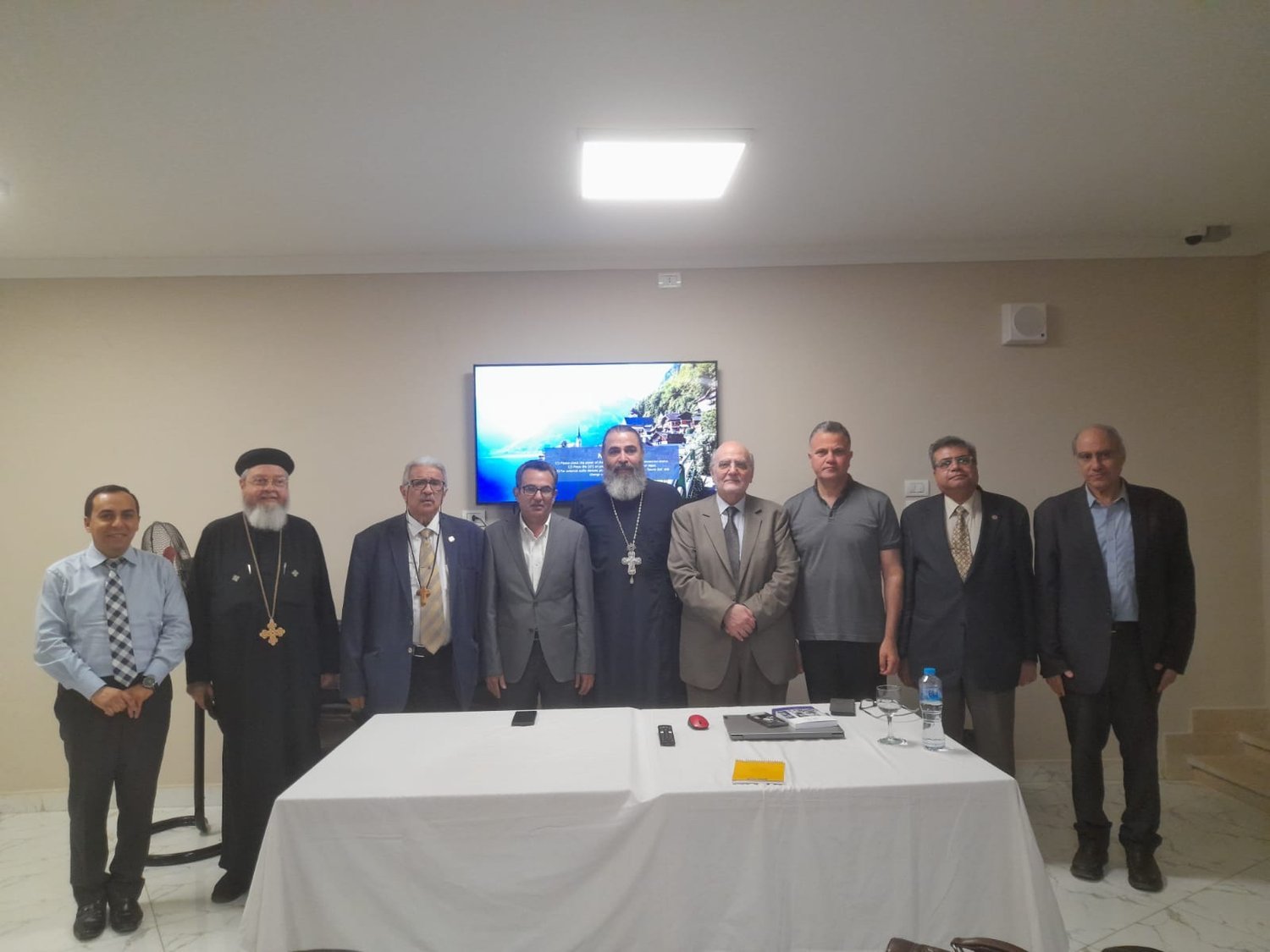





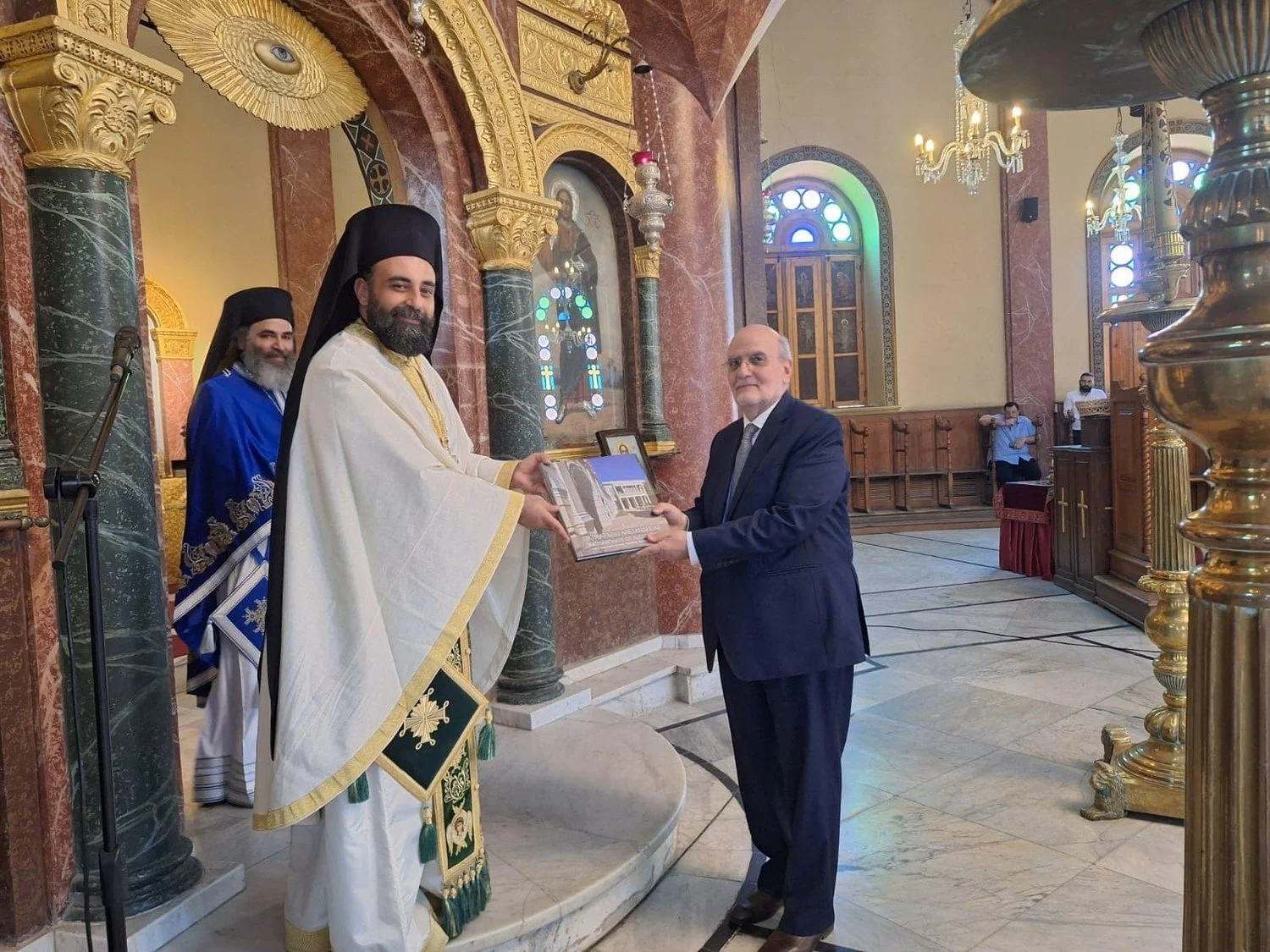






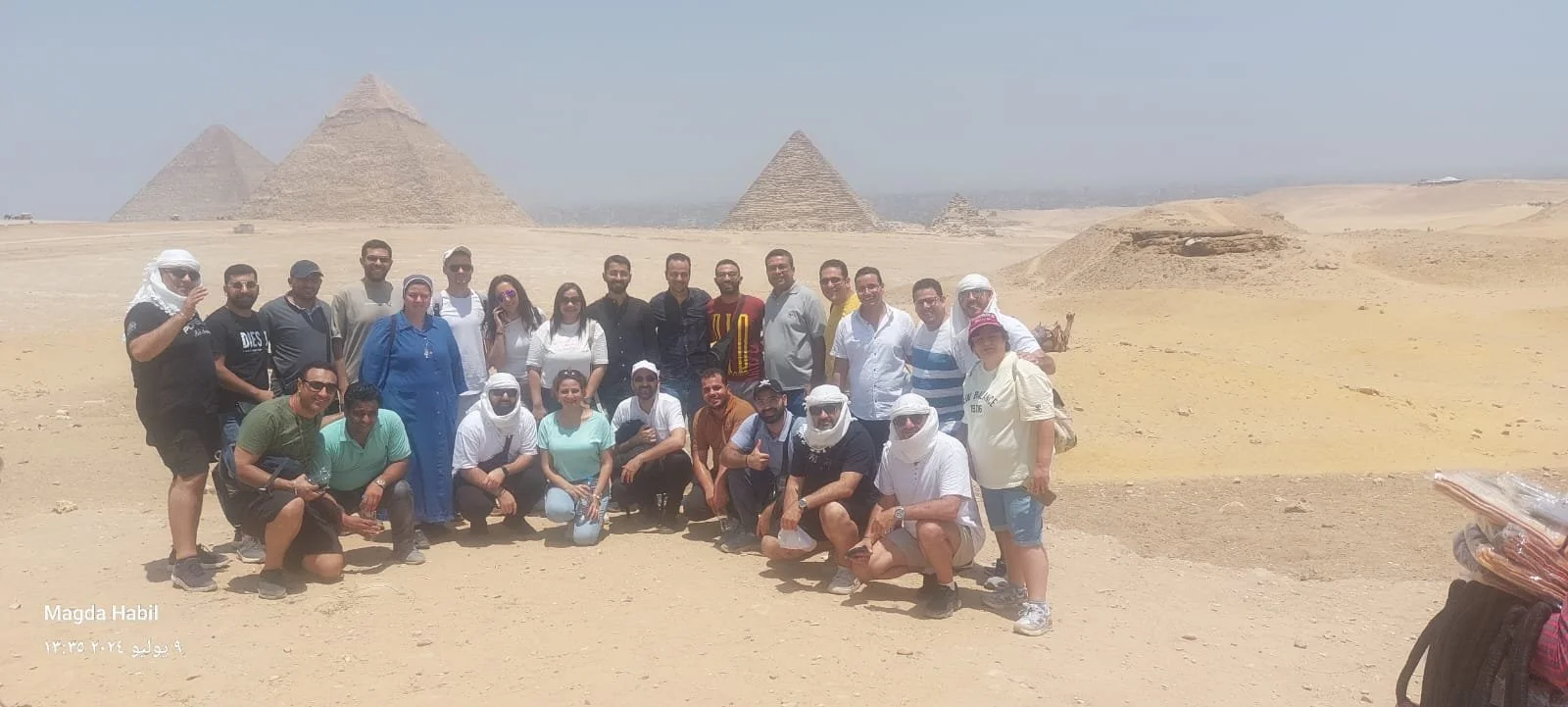
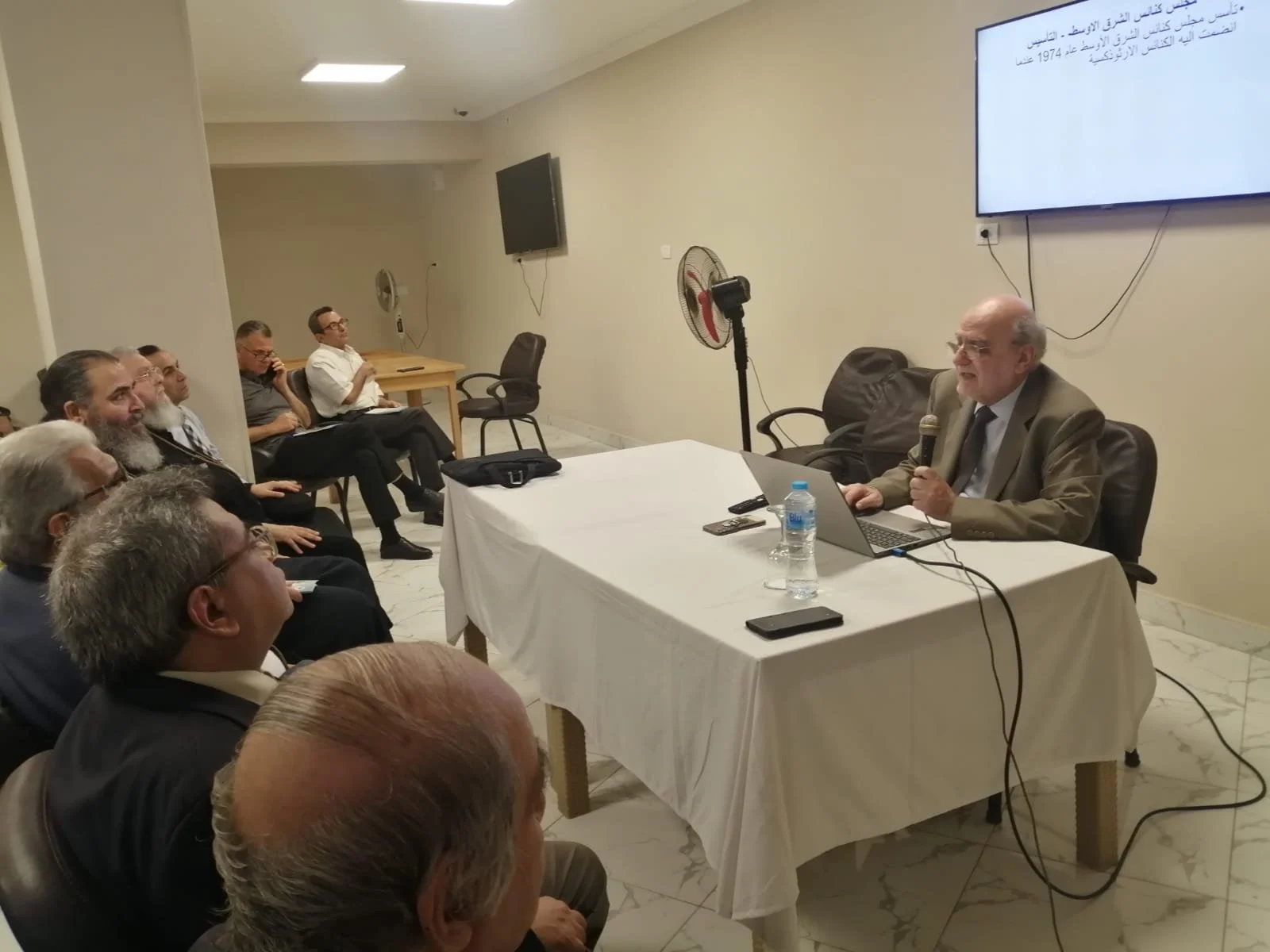
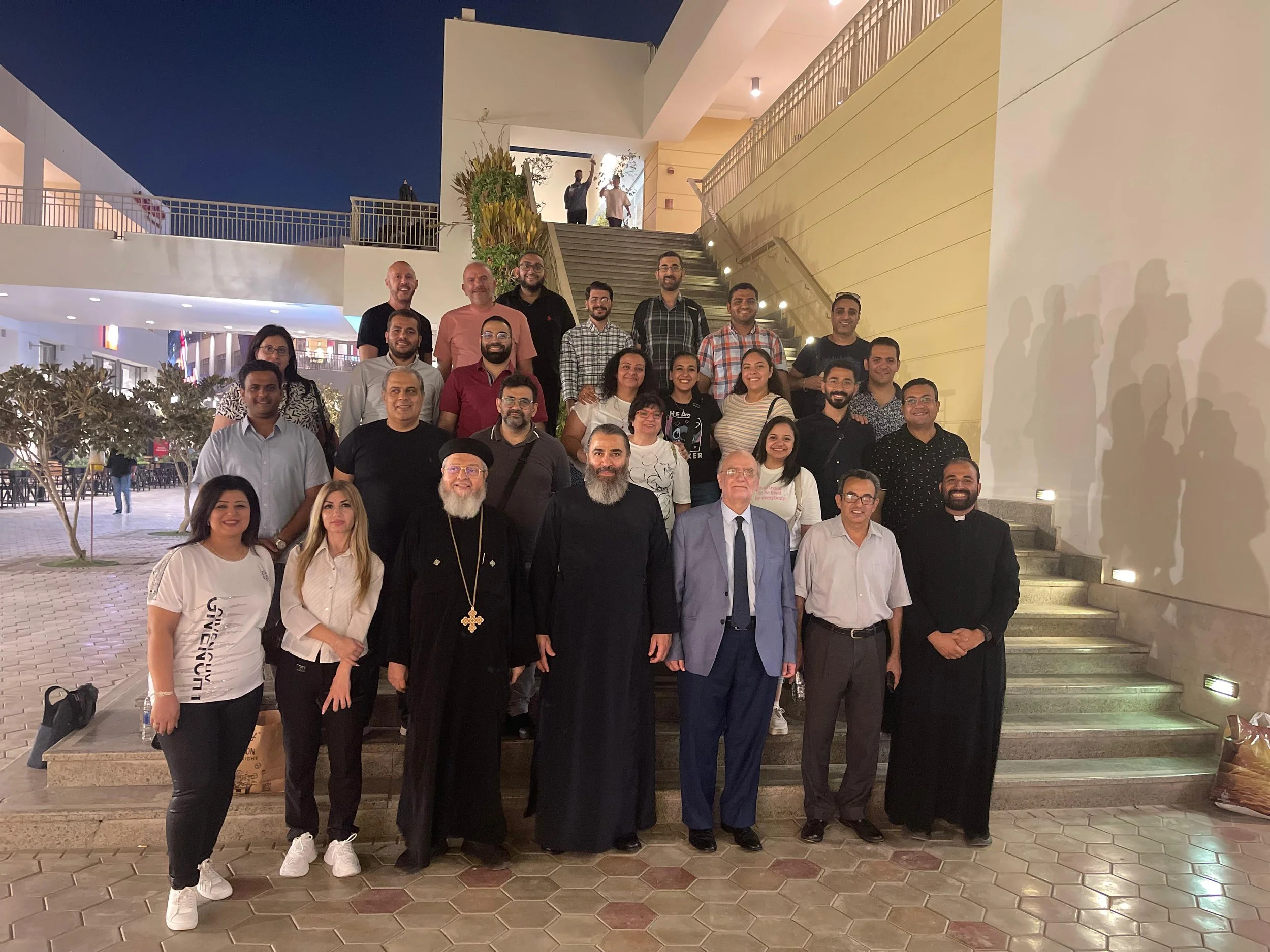
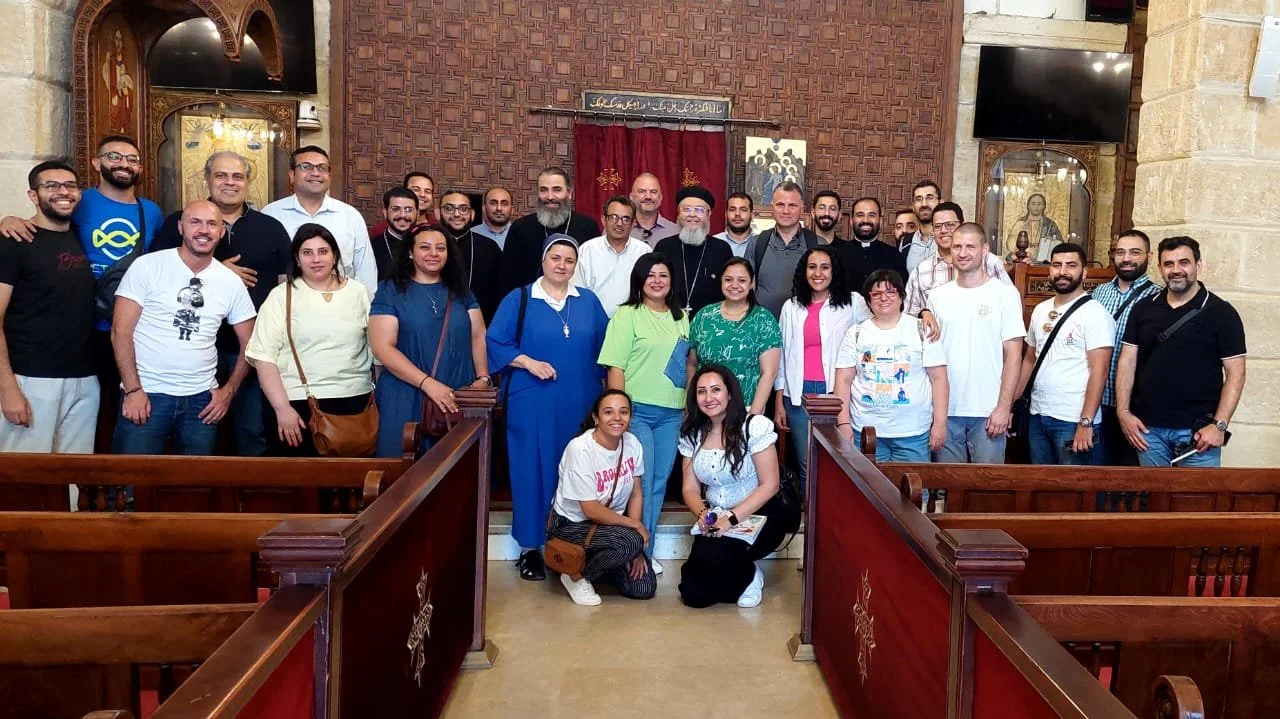
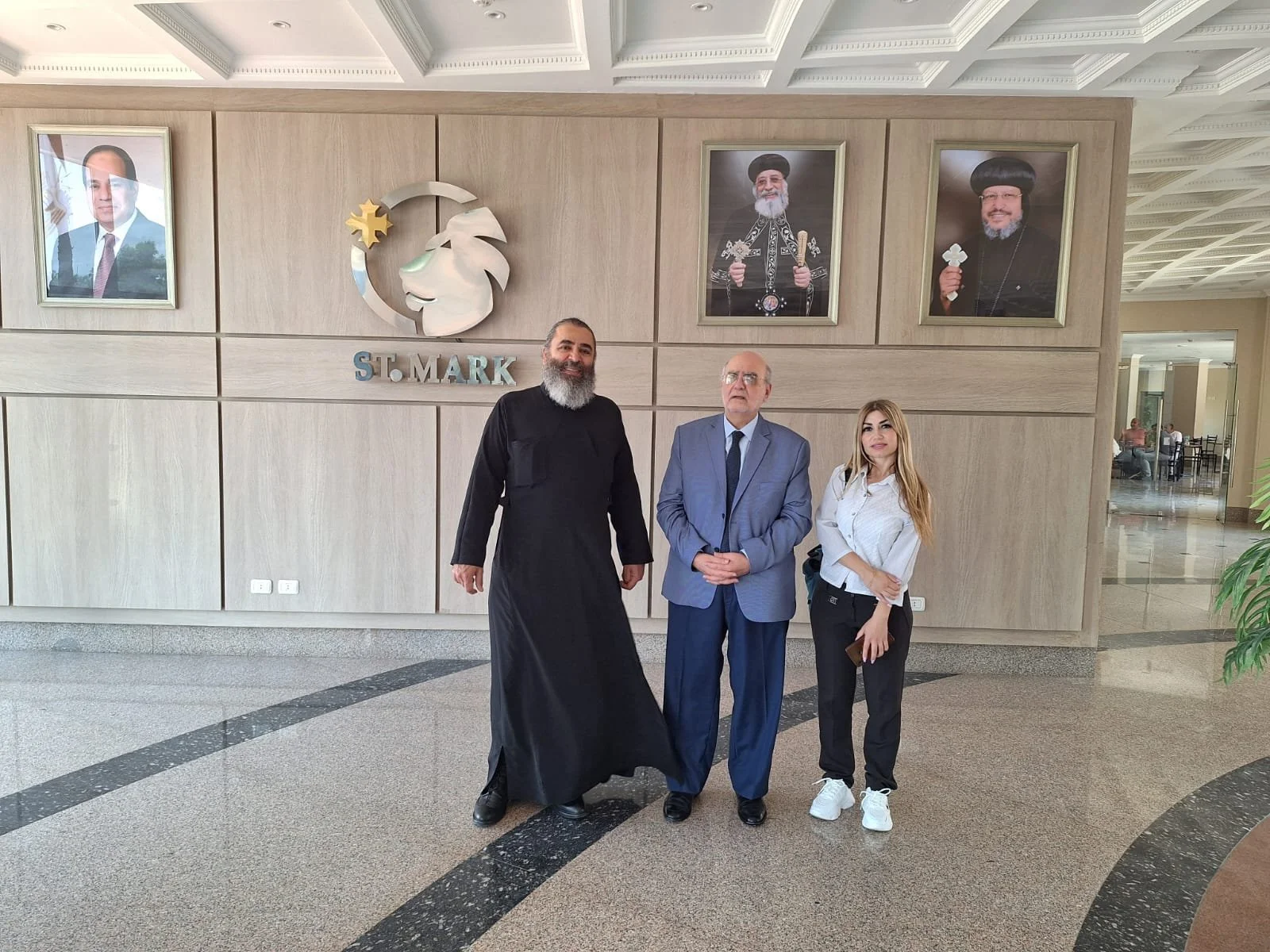


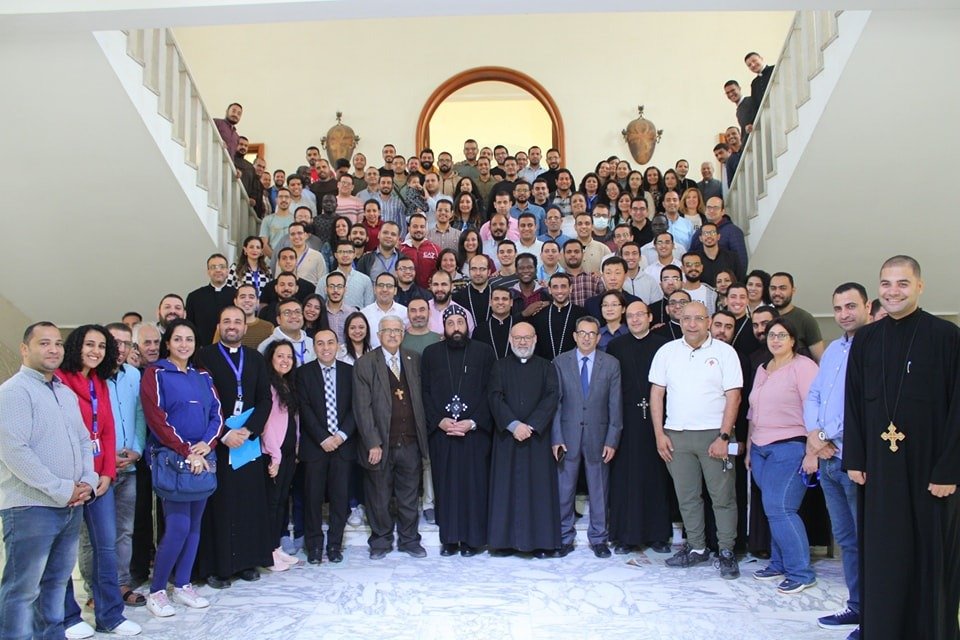
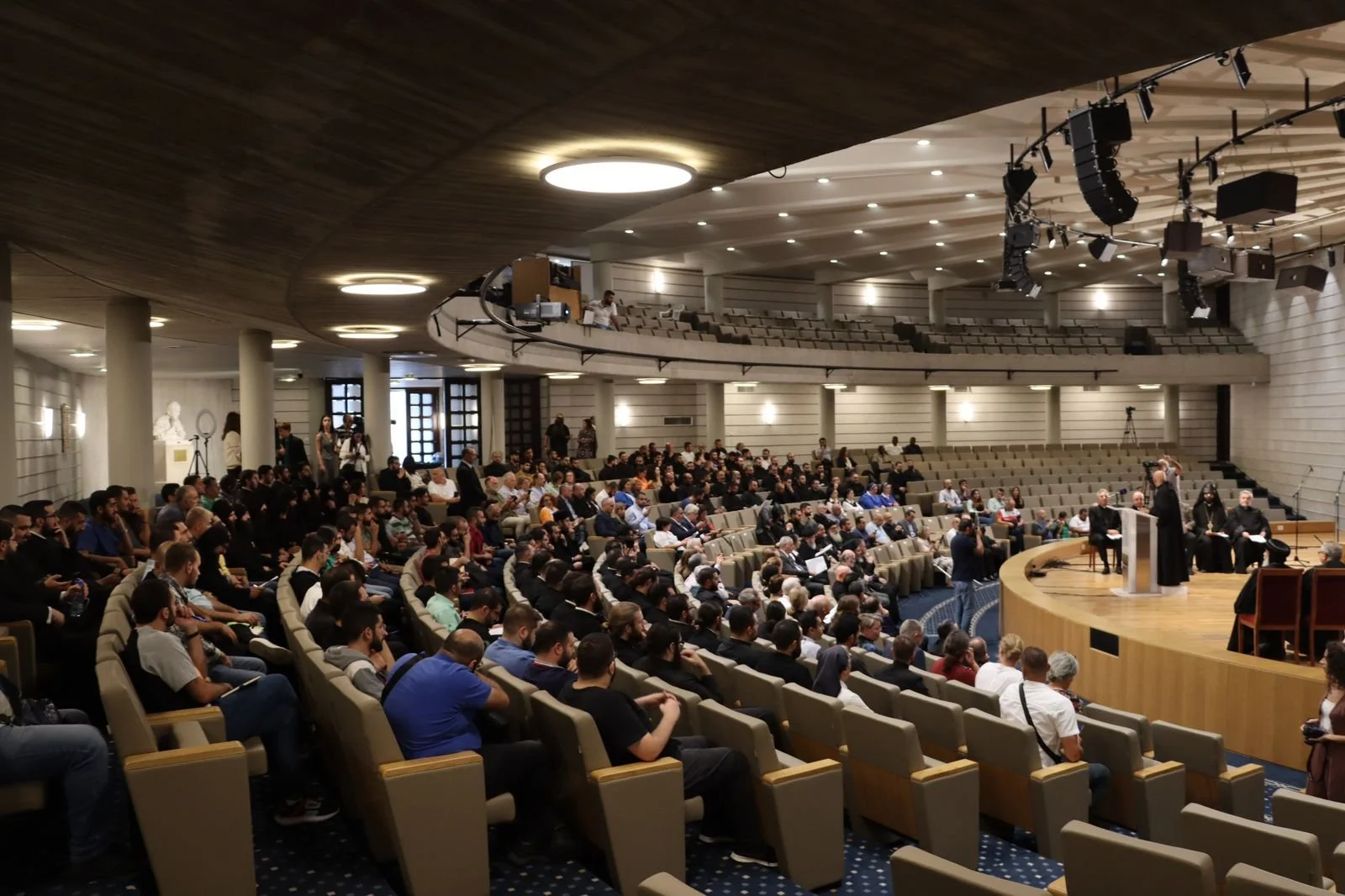



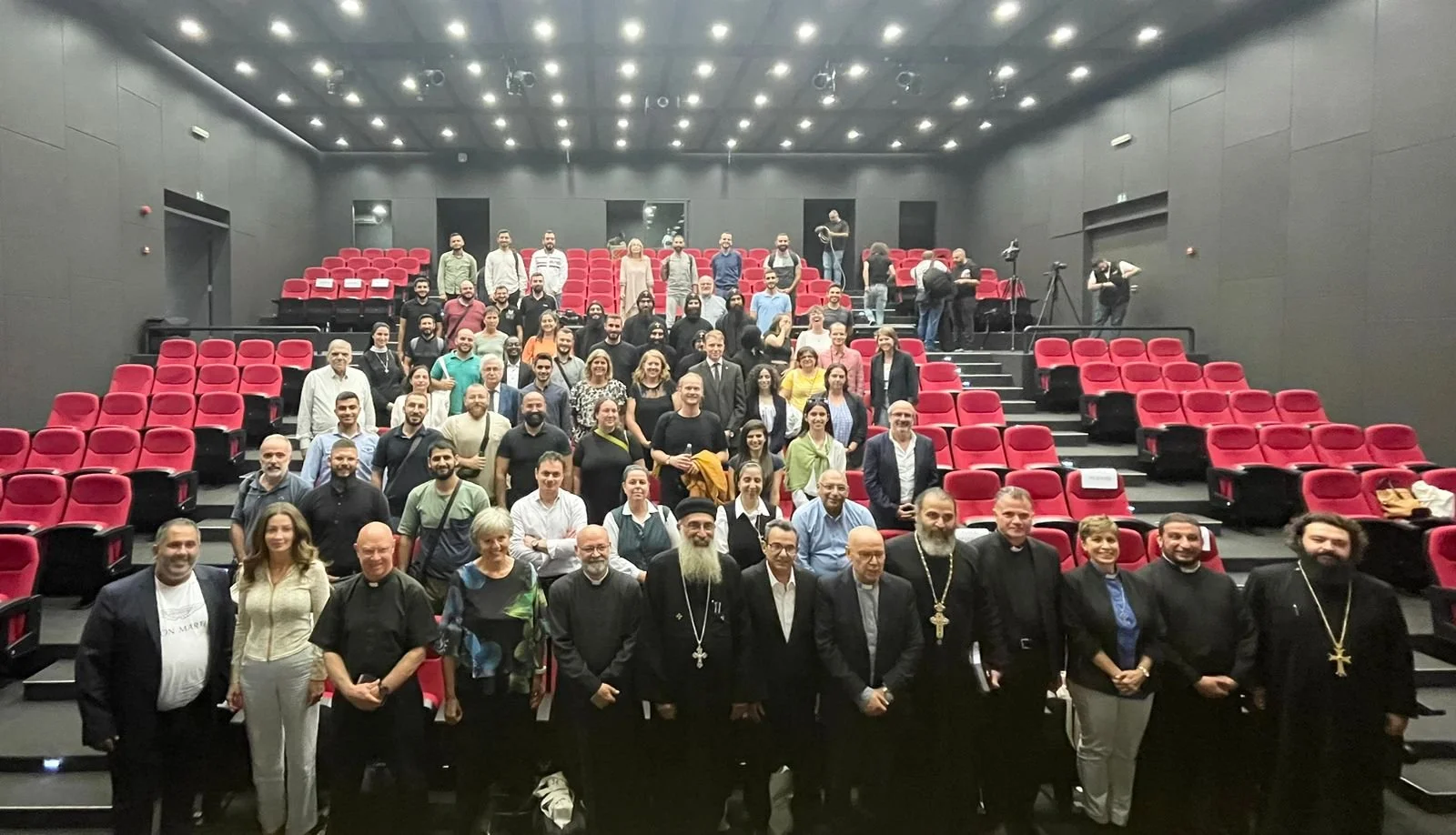



The Middle East Council of Churches (MECC) issues its annual report for the year 2023. It compiles in its pages the activities of the Middle East Council of Churches and the achievements it has accomplished at various Ecumenical, Theological, humanitarian and media levels. Despite a year burdened with global fluctuations, the MECC was not prevented to achieve its mission and desired goals of building bridges and standing together, in addition to spreading the values of love and fraternity, and the culture of peace and dialogue among all Church Families and Religions, from the Cradle of Christianity to the whole world.
Hence, through this report, the Middle East Council of Churches (MECC) reaffirms the necessity of adhering to faith, continuing to Pray together, and relying on our Lord Jesus Christ, in order to overcome all the difficulties and challenges that cast their shadows over the Middle East.